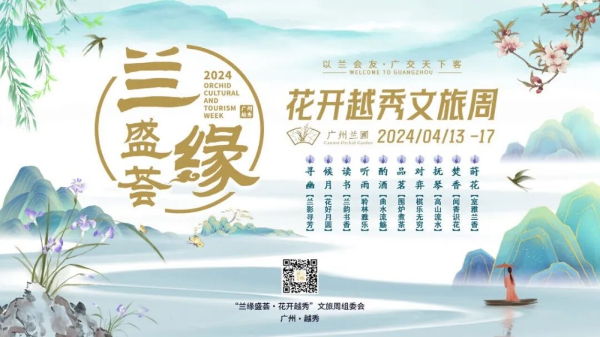The 2024 Orchid Cultural and Tourism Week will kick off from April 13 to 17 in Guangzhou's Yuexiu District. Canton Orchid Garden welcomes you to experience the "Ten Elegances", namely ten major traditional cultural activities.

The "Ten Elegances" are a summary of the lifestyles cherished by ancient literati. The word originated from Yuan Mei, a writer in the Qing Dynasty. It refers to refined and cultured pursuits. Below are the ten elegant activities.

Burning incense

Burning incense, the first on the list, originated in ancient times when people used it to ward off mosquitoes and eliminate impurities from their living environment. They would burn certain aromatic plants in flames to create fragrant smoke. Whether during tea tasting, reading, or meditation, burning incense has become an essential ritual.
Venue: Diwulanpeng (第五蘭棚) (No. 4 on the map)
Tea tasting

For the Han nationality in China, drinking tea emphasizes the concept of "appreciation". Tea tasting can make people find peace and meditate on life and purify the soul. The acts of offering tea to guests and forging friendships over tea embody the Chinese values of humility, harmony, courtesy, and respect.
Venue: Maoshe (茅舍) (No. 8 on the map)
Listening to the rain

In Chinese, the character "雨" (rain) is derived from pictographic representation, depicting the descent of rainwater from the sky. While it is a common natural phenomenon, ancient Chinese people regarded it as an elegant activity, appreciating it with great attention.
Venue: Songpi Pavilion (松皮亭) (No. 1 on the map)
Playing the Guqin

The Guqin is the most esteemed musical instrument in ancient Chinese culture. Since the Qin and Han dynasties, the Guqin has gradually become an indispensable companion for literati and scholar-bureaucrats. The legendary friendship between a guqin musician Yu Boya and his biggest fan Zhong Ziqi has been passed down from generation to generation. So the Guqin is regarded as a symbol of friendship.
Venue: Jiangheshui (江河水) (No. 15 on the map)
Playing chess

The game of Go (or Weiqi) originated in China. In ancient times, intellectuals would play chess as a form of recreation and entertainment. Playing chess can enhance one's ability for strategic thinking and develop a comprehensive decision-making method.
Venue: Mingjingge (明鏡閣) (No. 18 on the map)
Drinking

Ancient people enjoyed drinking wine because they pursued romance in life, using wine as a means to savor the essence of life. Throughout history, many sages have gained insights into the world and achieved an understanding of life through a state of intoxication.
Venue: Lanting Square (蘭亭廣場) (No. 10 on the map)
Gardening

Gardening originated from the lifestyle of ancient literati who used flowers to express their aspirations and emotions. Gardening refers to tending and nurturing plants, patiently awaiting their blossoming.
Venue: Chunguang Pavilion (春光亭) (No. 9 on the map)
Reading

In ancient times, books were limited, and impoverished families rarely had books. Those who had a passion for reading would tirelessly borrow books from various sources, overcoming hardships to cultivate their willpower.
Venue: Luting (路亭) (No. 5 on the map)
Waiting for the moon

It refers to the time before moon-watching, specifically the period of waiting before the moon appears. During this time, the moon is like a shy girl. Watching the moon gradually emerge is what makes this time truly memorable.
Venue: Shizishangloutai (獅子上樓臺) (No. 11 on the map)
Seeking seclusion

When it comes to mountain and water excursions, Chinese people appreciate the profound and mysterious beauty, as well as the implicit and unfathomable essence of mountains and water.
Venue: Fanghua Garden (芳華園) (No. 16 on the map)
Ticket price:Eight RMB per person
Opening hours: April 13-17, 9:30-12:00, 14:00-17:00
Address: No. 901, Jiefang North Road, Yuexiu District, Guangzhou (廣州市越秀區解放北路901號)
Transportation: Take Metro Line 2, Get off at Yuexiu Park Station (越秀公園站) and use Exit C.
All materials marked with "source: English.gz.gov.cn" on this website (including but not limited to text, photographs, audio and video materials) are the copyrighted property of Guangzhou International (the official website of Guangzhou Municipality). Without prior authorization from Guangzhou International, any media, website, organization or individual shall not transmit, interlink, distribute or republish such materials in any form. Any media and website authorized to republish such materials shall mark them with "source: Guangzhou International (English.gz.gov.cn)". Infringement of these copyrights will result in legal action.
